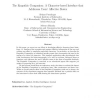121 search results - page 6 / 25 » Affective Model for Intelligent Virtual Agent Based on PFCM |
AGENTS
2000
Springer
13 years 11 months ago
2000
Springer
This paper presents a knowledge approach to designing team training systems using intelligent agents. We envision a computer-based training system in which teams are trained by pu...
IUI
2006
ACM
14 years 1 months ago
2006
ACM
Studying the relationship between natural language and affective information as well as assessing the underpinned affective qualities of natural language are becoming crucial for ...
AAI
2005
13 years 7 months ago
2005
In this paper, we report on our efforts in developing affective character-based interfaces, i.e. interfaces that recognize and measure affective information of the user and addres...
IAT
2010
IEEE
13 years 5 months ago
2010
IEEE
It is widely acknowledged that providing explanations is an important capability of intelligent systems. Explanation capabilities are useful, for example, in scenario-based traini...
ATAL
2009
Springer
14 years 1 months ago
2009
Springer
Due to its important role in dialogue, politeness has been widely studied both from a theoretical point of view and at a practical level in virtual agents. However, few attention ...


